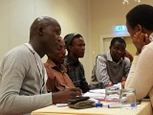National Alcohol Policy Alliance formed in Lesotho
Civil society organizations in Lesotho have come together to form the Alcohol Policy Alliance Lesotho. The new network aims at being a watchdog for and supporter of evidence-based alcohol policies in the country.
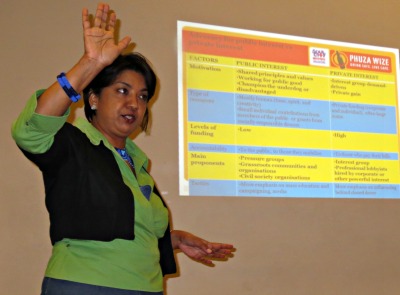 Text and photos: Torunn Sæther, Blue Cross Norway
Text and photos: Torunn Sæther, Blue Cross Norway
‘We need look at broader solutions to make it easy for people to make the healthy choice!’ This was one of the key messages from Savera Kalideen (picture left), Advocacy Manager in Soul City (South Africa) and chair of the Southern African Alcohol Policy Alliance, in a two-day advocacy training held in Maseru, the capital of Lesotho. Savera Kalideen was referring to the possibility of banning alcohol advertisement, increasing taxes and thus prices on alcohol, and regulating the availability of alcohol. All in line with the recommendations put forward by the World Health Organization, and very much needed in Lesotho. The training, which was supported by Soul City, Blue Cross Lesotho, Anti Drug Abuse Association Lesotho (ADAAL) and Blue Cross Norway, welcomed over 30 participants. The participants all represented civil society organizations active in the newly established network Alcohol Policy Alliance Lesotho (APAL). They came together to learn from Kalideen and each other on how to best advocate for what Lesotho really needs: A comprehensive evidence-based alcohol policy and the effective implementation thereof.
Lesotho is revising their National Alcohol Policy
In Lesotho work has been ongoing for some time to revise the industry influenced alcohol policy from 2007. That policy was found not to be in line with recommendations put forward by the World Health Organization, and it was never implemented. The Ministry of Health (MoH) working with relevant civil society organization, recently completed their final draft of the revised National Alcohol Policy. This draft, however, has yet to be presented to the Parliament. It is critical that the process of putting this policy draft into law does not slow down. Alcohol – a severe health risk factor Alcohol is having a very negative impact in Lesotho. One example of such impact were shown in the recent Global Burden of Disease Study; For disability adjusted life years (DALYs) alcohol use represents the single highest risk factor to men in Lesotho! When looking at both women and men together, alcohol remains the 3rd highest risk factor. This needs to be effectively addressed and changed.
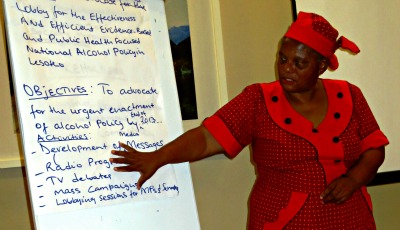 |
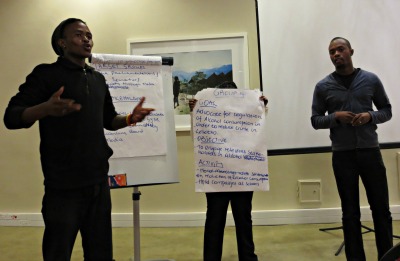 |
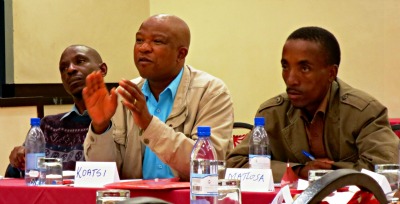 |
New alliance: watchdog and supporter of evidence-based alcohol policy
Civil society organizations in Lesotho have for several years worked to both prevent and mitigate harmful use of alcohol in the country. Blue Cross Lesotho has for example been running the Thaba Bosiu Prevention and Treatment Centre for Alcohol and Drugs (TBC) for over 20 years. APAL as a network has brought these organizations together after being formally initiated following the dissemination of the 1st draft of the revised National Alcohol Policy in Lesotho. Some of the organizations making up the initial group working to establish APAL were then already members of the drafting team led by the MoH, and some were not.
First training in 2011
Alcohol Policy work has been on the agenda of many of the organizations now active in APAL for a few years already. In March 2011 many of them sent representatives to the three day training in Evidence-Based Alcohol Policies. The training was carried out by FORUT, Blue Cross Norway and the International Blue Cross in cooperation with the Ministry of Tourism, Environment and Culture (this was the ministry responsible for the National Alcohol Policy at the time).This training showed a civil society deeply committed make use of the known effective strategies to bring about change in Lesotho.
Regional efforts
Over the last few years, steps to ensure stronger civil society participation in similar processes have also been taken in Malawi, Zambia, South Africa, Namibia and Botswana to name some, and similar networks to APAL have been set up there. Also at the regional level civil society organizations have focused on the need to work together in advocating for the development and implementation of evidence-based alcohol policies. This culminated last year with the Southern African Alcohol Policy Forum in Johannesburg, during which we saw the formal establishment of the Southern African Alcohol Policy Alliance (SAAPA).
 Mphonyane Mofokeng(picture above,left), executive director of ADAAL, was there elected as Lesotho’s representative to the SAAPA board. Together with colleagues from Blue Cross Lesotho, the Thaba Bosiu Prevention and Treatment Centre, and the Lesotho Council of Non-Governmental Organizations (an umbrella org.), ADAAL is working energetically to make APAL a voice to be reckoned with in Lesotho. Last april’s advocacy training for the APAL members was one of the steps leading the way to reach this goal. Advocating for action and change The spirit showed by the representatives at the advocacy training reconfirmed their commitment to their cause. Having learned from Savera Kalideen how Soul City are working to reduce the harmful use of alcohol in South Africa, both increased their understanding of the technical side to advocacy as well as their belief in their ability to make a big change in Lesotho.
Mphonyane Mofokeng(picture above,left), executive director of ADAAL, was there elected as Lesotho’s representative to the SAAPA board. Together with colleagues from Blue Cross Lesotho, the Thaba Bosiu Prevention and Treatment Centre, and the Lesotho Council of Non-Governmental Organizations (an umbrella org.), ADAAL is working energetically to make APAL a voice to be reckoned with in Lesotho. Last april’s advocacy training for the APAL members was one of the steps leading the way to reach this goal. Advocating for action and change The spirit showed by the representatives at the advocacy training reconfirmed their commitment to their cause. Having learned from Savera Kalideen how Soul City are working to reduce the harmful use of alcohol in South Africa, both increased their understanding of the technical side to advocacy as well as their belief in their ability to make a big change in Lesotho.
- Forward, not in circles
Hon. Ramakeoana (picture left), Member of Parliament and also Chairperson of the Parliament’s Social Cluster Portfolio, followed parts of the advocacy training. In his closing speech to the APAL members he said: ‘Alcohol is destroying our economy, our health and our country. We have been going in circles, now we need to go forward!’ APAL will certainly take an active role in the time that comes. The members of the network
to drive the alcohol policy agenda and act as watchdogs. They will do their part to ensure that Lesotho’s new National Alcohol Policy will not become just another document and that its contents is in line with known best practices. The people of Lesotho deserve to see actual change, enabling people to make the healthy choice for themselves and their families.
RELATED ARTICLES
- New report highlights benefits of policy measures to prevent harmful alcohol consumption
- Alcohol use - a barrier to health and to the achievement of the SDGs
- Government investments in alcohol industry up against the wall
- Abstracts for GAPC 2020 – deadline 29 July 2019
- Involve young people as partners in prevention!
- A regional African alcohol coordination mechanism is needed
- New book reveals a series of unethical business practices by Heineken in Africa
- Next GAPC to be held in Dublin in March 2020
- SAFER – a new WHO initiative to boost national alcohol policy processes
- Trouble Brewing
